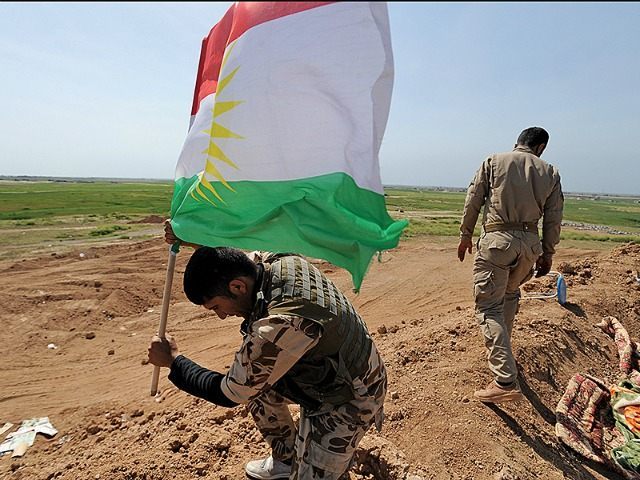The Turkish newspaper Hurriyet is reporting that supporters of the Iraqi Kurdistan Regional Government (KRG) are organizing a political party to challenge the pro-Syrian Kurdish Peoples’ Democratic Party (HDP), whose leadership is largely in prison.
The Islamist government of President Recep Tayyip Erdogan stripped the nation’s legislators of parliamentary immunity before arresting dozens of HDP officials, including co-chairs Figen Yüksekdağ and Selahattin Demirtaş.
While the HDP openly supported the Syrian Kurdish People’s Democratic Union (PYD), the KRG has distanced itself from both the PYD and the Kurdistan Workers’ Party (PKK), which both the KRG and the Turkish government consider the same organization. The PKK is a Marxist, U.S.-designated terrorist organization largely operating in southern Turkey.
The KRG will hold a referendum in its territory to split from Iraq and create a sovereign Kurdistan, with its government based in Erbil, Iraq.
The Hurriyet report, citing the Turkish-language newspaper Habertürk, says a number of small, pro-KRG parties have begun the bureaucratic process of creating a larger political party, the Kurdistan Democrat Party (KDP) of Turkey.
The group, the newspaper notes, would consist of members of the “three groups engaged in politics in support of Barzani”: the “Participatory Democracy Party (KADEP), Turkey’s Kurdistan Democrat Party (T-KDP),” and the already-established KDP. The party “aims to present an alternative to the Kurdish issue-focused Peoples’ Democratic Party (HDP).” The Turkish language version of the report adds that the party organizers had met in Iraq on multiple occasions to plan the political movement.
Habertürk cited information from a press conference the group’s leaders held in the heart of Kurdish Turkey, Diyarbakır, where they appeared to distance themselves from what they thought were tactics too favorable to militants by the HDP and argued that a niche existed for pro-Kurdish voters who did not feel comfortable with the HDP’s proximity to the PYD and its military wing, the People’s Protection Units (YPG/YPJ).
The HDP is a center-left party that has attracted Kurds and other minorities, such as Turkish Christians, who oppose the Islamist Justice and Development Party (AKP) and what many perceive to be growing authoritarianism under Erdogan. The HDP has openly supported the YPG – who cooperate with the United States against the Islamic State but Turkey has designated a terrorist group – with co-chair Yüksekdağ stating, “we do not see any harm in supporting them” in 2015.
The HDP aggressively opposed Erdogan’s referendum to move the country from a parliamentary system to a presidential one, which would greatly expand his power while not making adjustments to balance power among the branches of government. From prison, Demirtas argued that the referendum would not have resulted in a favorable result for Erdogan had he and his colleagues not been arrested to prevent them from campaigning against the presidential system.
While the HDP has supported the YPG and PKK, the Iraqi Kurdish KRG has not. KRG President Masoud Barzani once called the PKK and YPG “exactly one and the same,” and has referred to the PKK as “arrogant” and demanded they leave Iraqi Kurdistan. The KRG enjoys mostly positive relations with the Erdogan government, unlike other Turkish groups, and maintains a trade relationship with Ankara.
This has not stopped the Turks, who oppose Kurdish separatism in general, from standing against Erbil’s September 25 vote to establish a free Kurdistan out of Iraqi territory. Prime Minister Binali Yildirim condemned the vote as “irresponsible” given the ongoing struggle against the Islamic State in northern Iraq. “There are sufficient problem areas in our region and we don’t think it is right to create new problem areas,” he argued.
Some PKK officials have also rejected the idea of a free Kurdistan run out of Erbil, despite the PKK’s mission to establish a sovereign Kurdistan. “Kurds do not need a state,” PKK executive council member Duran Kalkan said this week, calling the state itself an “apparatus of oppression and exploitation.”

COMMENTS
Please let us know if you're having issues with commenting.